February 02, 2024
“And they’re off!” When horse race political journalism is in the lede, democracy is losing.
News Takes : Hot Takes | Our Take

Predictions are hard. Will Pennsylvania's famous weather-predicting groundhog Punxsutawney Phil see his shadow or not today? Will his response to his shadow give us an accurate estimate of how long winter weather will remain as we enter the last stretch into spring? The odds-makers predict that there is about a 70% chance the rodent prognosticator will see his shadow, but who knows? There is one thing we can predict for sure: 2024 is an election year, so there will be lots and lots of election news.
Election prediction and odds-making have become a kind of cottage industry in our news ecosystem. Driven by ongoing polls and different ways of aggregating the data, every news organization seems to have several desks reserved for writers and broadcasters who help audiences make sense of the statistics. There are media figures whose entire celebrity flows from their “nerd chic” at being good at explaining probabilistic prediction models.
Celebrity stats guys like Nate Silver, who applied his sports betting model to election forecasting at fivethirtyeight (now an ABC news product) and became a kind of darling for the political pundit class; or Steve Kornacki, who breaks down the odds as a crossover data analyst on both sports and political programs with his signature khakis and telestrator on NBC’s family of channels, showing that for NBCUniversal and their parent company Comcast, blurring the distinction between democracy and sport is good for business.
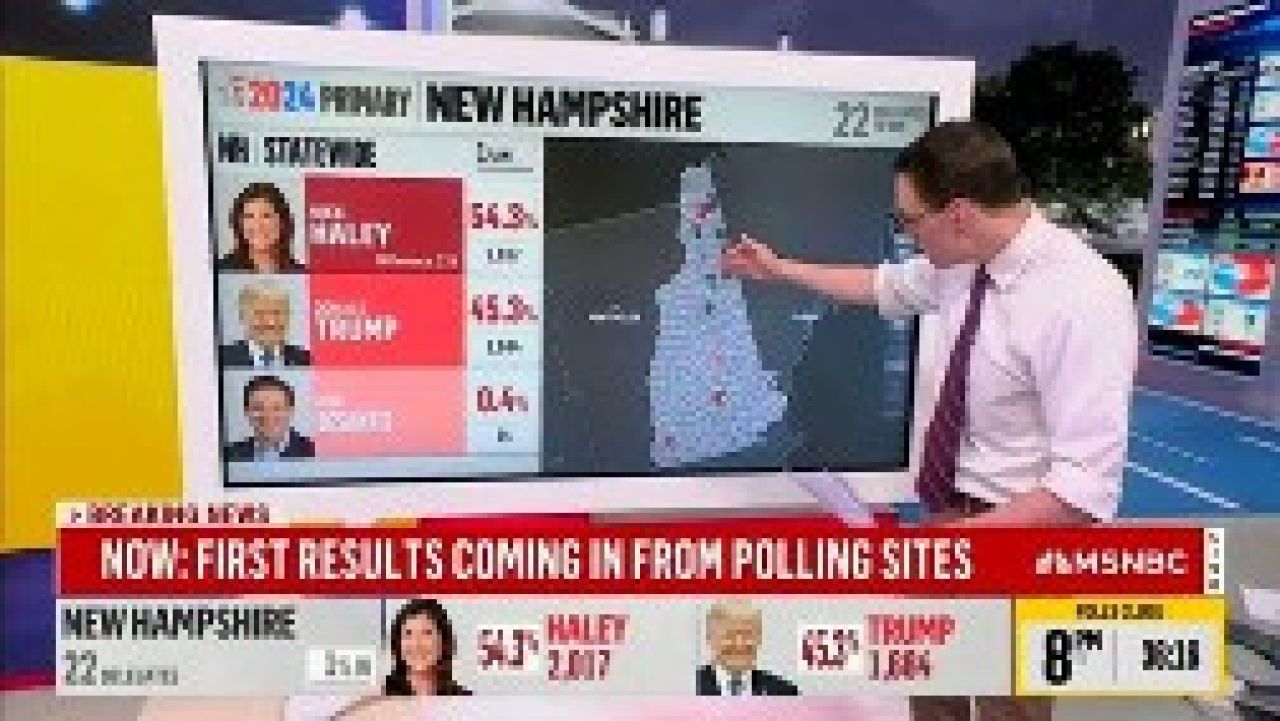
Khaki Kornacki
Credit: MSNBCFor quite some time now, election coverage has been dominated by this sensibility. In 2016, 75% of political journalism was horse race coverage –who was winning, losing, and why– and only 10% of the stories were about policy. Things didn’t improve in 2020, and haven’t improved since. It makes sense from the media companies’ perspective: the horse race model is good for generating suspense and excitement, drawing big ratings on election night, and generating revenue from clicks. It effectively turns democracy into a sports event where tribalized party voters act more like fans, donning the uniform, and rooting for their team.
But if deliberative democracy depends on citizens having information about issues related to governance so we can deliberate about solutions to the problems that we face as a society, when news coverage mostly tells the audience “Who’s ahead or who’s behind” in the race and obsesses on the means-over-ends tactics of winning, that’s a problem for democracy.
Just look at these stories from the Iowa and New Hampshire primary elections last month, which are emblematic of the continued dominance of horse race political journalism.
In the weeks before the Iowa caucus, CNN gave us this perfect distillation of the business-as-usual formula.

The article is just like the headline, listing poll numbers among different demographic groups –college-educated, independents, evangelicals –and whom they preferred. If you trust the polls, which most news organizations must since they breathlessly report every movement in them, then you knew that Trump held a “wide lead” in the race. Nothing about the candidates’ positions on issues; nothing describing their vision for the country or how they govern in relation to issues that Iowa voters felt strongly about; nothing to educate citizens on the stakes for government by the people, only predictions to manage the expectations of spectators following the race.
Once Iowa caucus goers had voted, the analysis of the results remained glued to the rules of the game. At ABC, they broke down the results according to the format:
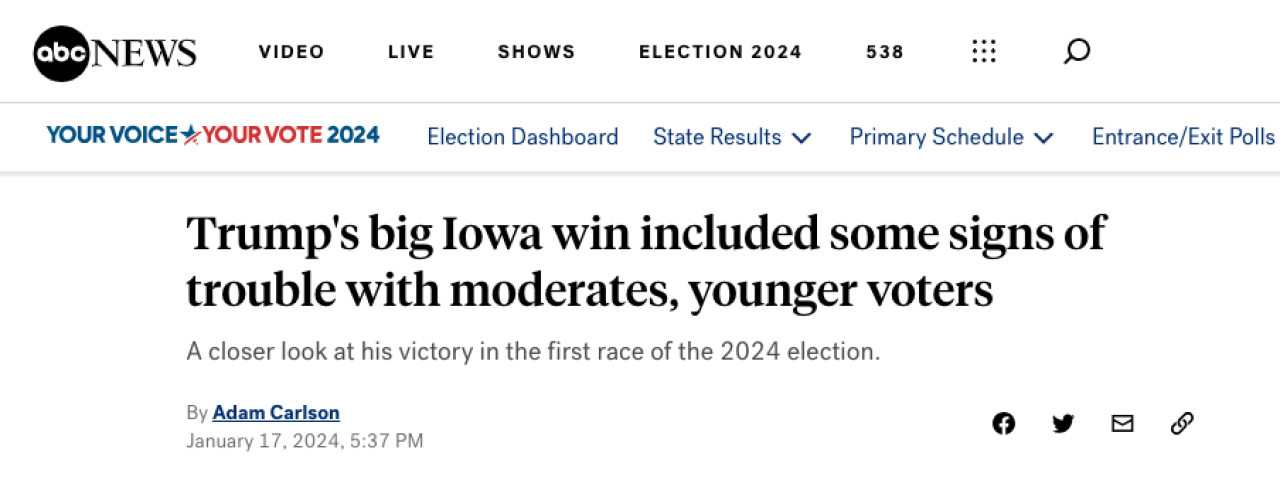
The article reported how Trump did with various subgroups, meaning the pre-determined categories pollsters decide to count: white evangelical, “very conservative”, and “MAGA movement.” They even included numbers on how voters broke when asked which candidate “fights for people like me” –whatever that means. Yet nary a hint of information on policy or governing philosophy that citizens could deliberate on, just which personality won, where the support for each candidate was weaker or stronger, and how big the margins of victory were. We learned something about who voted for Trump but very little about why they did or what the stakes are for democracy.
Déjà vu all over again at the New York Times, which had their stats guy, Nate Cohn, break down the results.
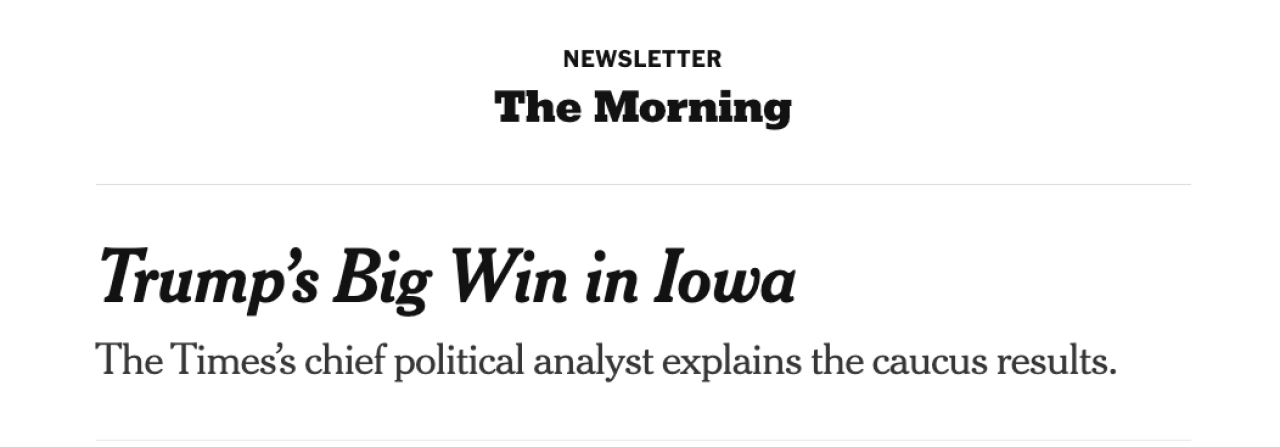
Again, Cohn offered very little beyond reporting the numbers and setting the expectations game: how strong (or weak) was the position of the candidates as the race rounded the bend toward New Hampshire? What might candidates have to do to eat into Trump’s lead and could those strategies work?
None of these news takes give news consumers a sense of what the stakes of the Iowa win were for governance. None tried to make sense of the minuscule turnout (around 110,000 or 15% of registered GOP) or that Trump’s “Big Win” counted only around 55 thousand voters in a state with over 2 million voters. Had they done so, they might have mentioned research that shows horse race political journalism demobilizes the public and discourages voting because people tend to sit out when a candidate has a high chance of winning or losing. None of these stories offered stakes for democracy, just who won the race and how that impacted the odds of who would win the next leg of the race.
Entering the backstretch towards New Hampshire, the election coverage teased the ongoing horse race in advance of the primary. The Associated Press remained fixed on presenting the odds in the race as it related to statistical margins, and utilizing framing language and combatant metaphors from the sports world, like “rematch,” “sweep” and “rematch.” It was about building suspense and managing expectations.
So too with the Washington Post, which gave its Day Before framing of the odds down the stretch.
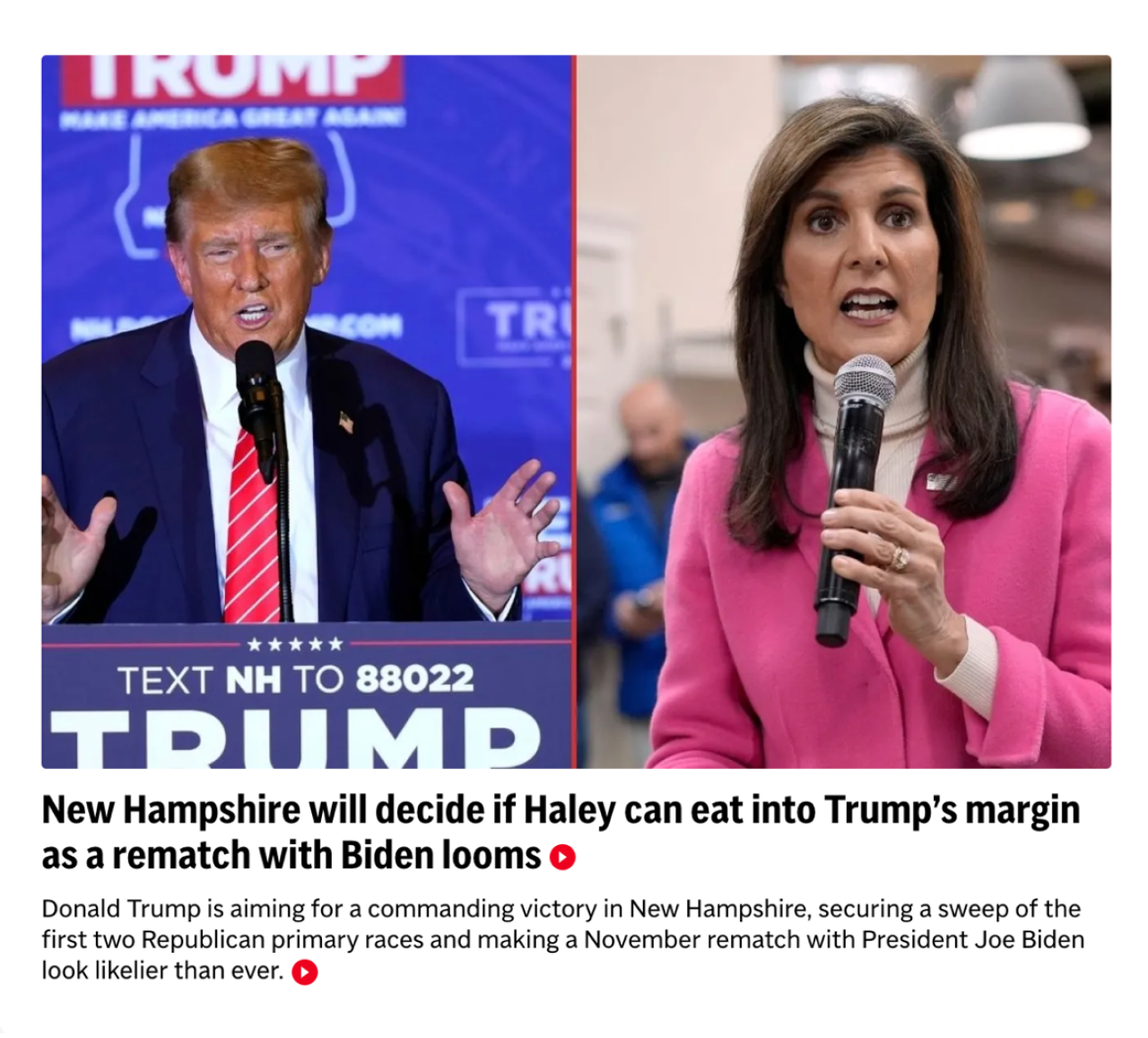
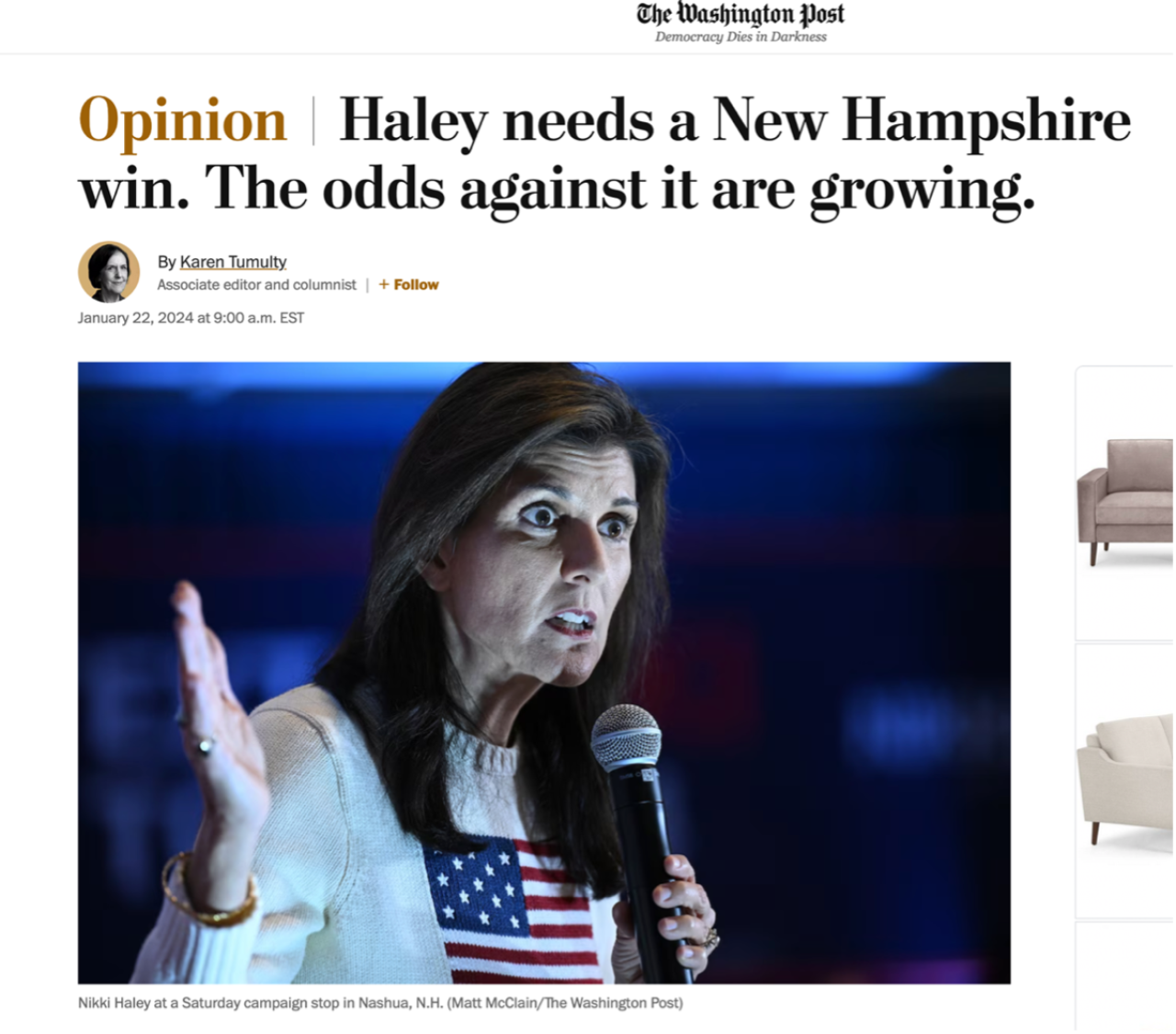
No stakes for democracy, other than Trump being the winner, just the odds of Haley winning. On election day, the New York Times gave the horse one last whip, giving live updates to stoke the potboiling suspense as the audience waited for results.
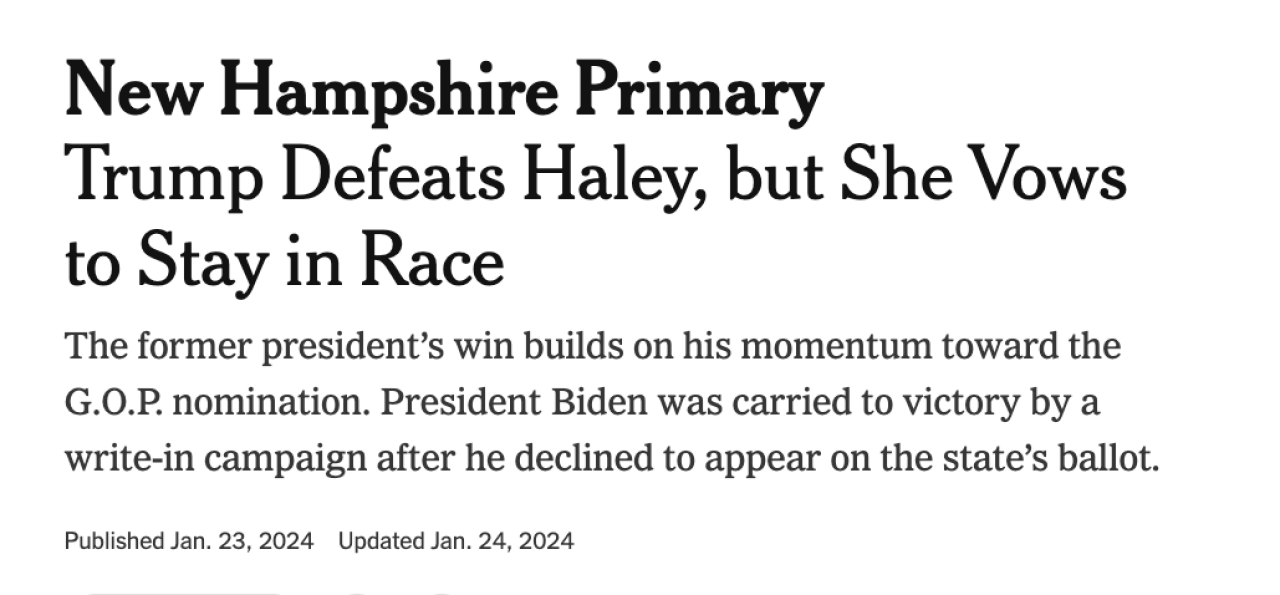
For decades now, NYU Journalism professor, Jay Rosen, has been championing an alternative to horse race political journalism that would better serve democracy: a Citizens Agenda. Report not the odds, but the stakes, and let citizens - not politicians and their campaigns - determine those stakes. Reporters should not focus on what the people in power think will serve their strategies for winning, the categories and ideas reaffirmed by the feedback loop of daily polling and reporting on the polls. Rather, news organizations should ask citizens what issues are important to them and keep refining those questions. Then they should make the candidates compete for citizens’ votes by responding to these questions. Those are the stakes.
By reminding news consumers how candidates have governed before, how they might deliberate with people who think differently than they do, and how they might deal with the issues that are important to citizens, a better-informed electorate would have the information to make deliberate choices. But when horse race journalism dominates, when the odds are foregrounded and the stakes are ignored, voters mostly just know who is winning or losing.
We know that horse race journalism that focuses on poll numbers and strategy creates predictable outcomes. It impacts voters’ behavior in a kind of feedback loop. In a world where consumers are increasingly taught faith in probability by Amazon Web Service ads touting success through their data analytics or Fantasy Football apps that use probabilistic forecasting models to suggest which players to play, people do just what they’ve been conditioned to do. So, when the news coverage of democracy is also dominated by polling, odds-making, and data-driven prediction models, voters follow along in the same way. Foregrounding the odds and backgrounding the stakes creates a feedback loop where voters back candidates without much knowledge of what they stand for because they are likely to win.
We know horse race and game-framing election coverage generates distrust in politicians because when political journalists make everything about winning strategies and effective marketing, voters get as cynical as the savvy pundits who treat it all like a game. Horse race coverage gives huge advantages to novel candidates or celebrities with name recognition and shortchanges third-party or long-shot candidates who might be great on the governance issues that voters care about but who never crack 5% in the polls. Who wants to back a loser, right? But equally if not more importantly, the public receives less information about public policies and candidates’ positions on important issues related to governance thereby ensuring an uninformed electorate is deciding who will govern.
We get the election results that the research would predict of Horse race political journalism. And it’s not serving democracy well in the least.

Once you are aware of the dominance of this impoverished form of political journalism and can spot it easily (hint: look for contest framing and sports metaphors), hopefully you’ll seek out something more. Given the dominance of horse race election coverage you’ll have to search for it. After New Hampshire, the horse race polling infotainment complex is going to be turning up the volume with stories on who’s up or down in the Biden-Trump “rematch.” Given the economic incentives, it will be hard to find much else. But hopefully you’ll feel that just knowing who’s winning or losing makes you feel like a passive spectator in an ongoing spectacle rather than an active participant in a deliberative democratic process.
When horse race political journalism gives the odds in the game and not the stakes for governance, the noise-to-news ratio is way too high. If you know what’s good for democracy, you should tune it out. –M.J.
